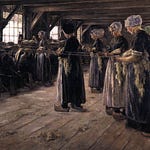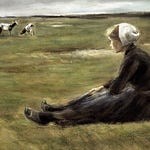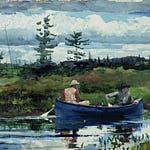This essay could just as easily be called “let them fail” or “let them experience” or “let them experiment” or, maybe the one I like best (although it doesn’t really fit in with the title theme) is “you’re not their only teacher”. We’ll stick with what we got.
Let them learn. In that I speak not of learn as in send them off to school. In fact, I think learning is best done outside of those dreary walls. When I say “let them learn”, I am suggesting that we allow our children to try things, to experience things that might look risky or doomed to fail, to know that what they are doing is not going to work but to allow them to do it anyway. We can absorb information by reading a book, but to fully learn, we must experience. We need to take information gathered from pages or ideas or inspiration, apply it, and then observe how things unfold.
Children, like us, learn through doing. They learn through experiencing. The greatest lessons are ones that come after strife and struggle. Sometimes those lessons are exciting and fulfilling and sometimes they are sad and disappointing. Neither is wrong nor right. Neither requires the parent’s intervention. Let them build the tower knowing the next block will collapse the whole thing. Let them make their homemade recipes that taste like hockey pucks and then walk them through a recipe that doesn’t. Let them see the fruits of their efforts either wither or bloom. Your judgment call is not relevant when there are lessons to be learned.
It can be hard for parents to see their little urchin really struggle with something and fail, but it’s their reaction to this that we should be more concerned with. Do they collapse in failure? Do they wail and throw a tantrum? Do they shrug and abandon their project? Or do they use their frustration to return to the drawing board? There is a serious lack of resilience in youth today. Too much helicopter parenting, too few exposures to wild, unmanaged play and imagination. We’ve traded life learning for book learning and confused them for the same.
We need to connect how our efforts bring forth or fail to bring forth a desired result. That’s how all of us learn. Having been on Instagram for many years, I sometimes felt like I was hiding behind a one way mirror, observing people in the other room. One of the things I was most surprised by was how many people confuse absorbing information for doing something. They will read and collect information and ask many questions. It’s a sort of ‘slight of hand’ on the soul. We think that by reading we are learning and that learning is doing. This is altogether backwards. By collecting information, we are collecting information. It’s in the doing that we learn. There is no shortcut. If we can teach that to our children, they will be far better off.
In experiential learning, parents have to get out of the way a little. We have to be there, to do the little dance of near and far. As much as we love our children, we are not their creators. We are their caregivers and their protectors, their loving and loyal ma and pa, but they come from a Creator with big ideas for them. To dampen or stifle what they are here to do and learn is no favour.
I remember when one of our daughters became immersed in a book series when she was young. They all tended to do that. But this daughter, our youngest, was absorbed with the heroine in one of her books - a young woman proficient in bow hunting. Our daughter would talk about bows and how to string them and how to hunt a squirrel, but she didn’t really know. She read the story. We suggested that if she wanted to learn how to use a bow, we would find her a teacher. She did and so we did.
Only the bow student wasn’t as proficient as the imagination led her to believe. She was frustrated with “how hard” it was to actually learn, but she kept with it. We always had a deal with our kids, we would sign them up for sport’s teams or classes, but once they made that decision, it was a commitment. There was no quitting. They had to go until the season or the classes ended. There is a moral obligation to a team that supersedes one’s whims. Our family still laughs at some of the shenanigans of our older daughter who wanted to play soccer at six or seven years old and then decided she despised it. She would stand in the middle of the field glaring at us for making her go while both teams played around the human pylon. We pretended not to notice as we cheered on her team. That was a long summer. But I digress…
Our little bow hunter in the making stuck with it. With arrow after arrow shot, her frustration reinforced determination. That’s what we’re after as parents - allow the frustration to build determination. Teach that. Demonstrate that in your own life. Let your kids see you take on new things. Talk them through what you’re doing and what you’re going for. In the end, our daughter not only stuck with her teacher, she practiced continuously on her own. She learned about her body, her frame, her concentration, the nuance of her bow and arrows. She became extremely proficient and earned confidence through tenacity. The squirrels had reason to fear her.
For us, this was the great benefit of homeschooling. We wish we had done it with our two older daughters, but it wasn’t until our last child that we really understood the failures of the school system. I remember when one of our daughters was absorbed with rocks and geological formations. I told her teacher how entranced she was, how we were going to the library every week and getting books, and that we had a date with an elderly fella’, a retired gemologist, to learn from him and see some of his collection. The teacher was horrified (not the reaction I was expecting). “Don’t do that! We don’t learn about geology until next year. You’ll confuse her!” That was it for me. School was not the place for my children to learn.
Learn or absorb? Which is it? To learn is understanding beyond the facts of a thing. There is a framework to it. It calls upon our character and our fortitude. If I had a penny for every time someone said to me, “I love learning about X, but when it comes time to do it, I have paralysis by analysis”. So they spend their whole life pretending that when they collect enough information, they will actually start doing something with it. That’s self-inflicted torture. That’s a terrible way to have to move through the world - unable to trust that you have what it takes to just do, to learn, to risk whatever because the outcome, though not assured, is worth the effort. Who cares if you mess up. And why do you? If you get it wrong, you will be able to sift through the failure for the nuggets of experience that will bring you closer to your desired result next time.
Perseverance. Teach that. Teach that by backing off and allowing your children to experience it. Let failure and disappointment sit sour in their mouths and love them all the while. Don’t try to fix it. Just love them through it. Talk to them about it. Share some stories from when you were a little girl or boy and really wanted that thing and that thing felt so far away and so you had to work really hard to get it. Read them stories that exemplify the hero’s journey. Discuss those stories. Point out all of the failures along the way. Watch for the cracks.
Be honest with yourself about your children’s character. It’s not a dereliction of duty to think your child is anything but angelic. If you see, when they’re young, that they tend to avoid challenge or fly off the handle when things don’t go their way, address it. Sure, talk to them, but continue to expose them. It’s not just our job to entertain and brush their teeth, cheer them on endlessly, and hand out allowance once a week. As parents, we need to show the trust and confidence in our children that we want them to develop in themselves.
So let them learn. Be clear on what learning is. When they grow up, they will carry into the world, the framework of learning and not even know it’s there. They will be curious and willing to try things. They won’t confuse information with action. They will trust that trying something, even if it doesn’t turn out as hoped, is not a reflection of their inadequacies, but that there is something even better waiting. These are no small things but they start with small things. Let life teach them. Let them learn.















